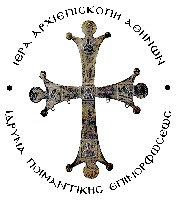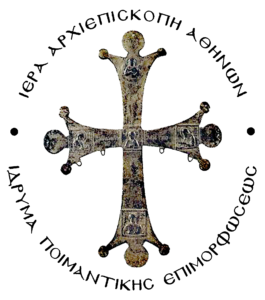Jerome II
The Institutional Framework of IPE
The Institute for Pastoral Education of the Holy Archdiocese of Athens is an Ecclesiastical Institute of the Holy Archdiocese of Athens for Education and Research, distinguished for its originality and innovation in the current state or ecclesiastical affairs. The Institute for Pastoral Education (hereinafter ‘IPE’ or simply ‘The Institute’) was established by Decision nr 1631/896/28−5−2009 (published in Government Gazette B.1011). It became a not-for-profit Self-Governing Ecclesiastical Legal Person of Private Law pursuant to Decision nr. 22/128/14-1-2015 of the Permanent Holy Synod of the Church of Greece (published in Government Gazette B.269) and the Regulation that amended and codified its Rules and Regulations in accordance with the provisions published in Government Gazette vol. II, 5171/9-11-2021.
The Institutional Framework of IPE’s operation was configured in accordance with Article 64 of Law 4415/2016, which was subsequently amended by Article 106 of 4763/2020 and Law 4823/2021. It contains the following provisions:
- Is a nation-wide provider of lifelong education and of both general and pastoral training for clergy, church staff and other employees of the Holy Metropolitan Dioceses and the legal entities and other bodies affiliated with or belonging to the Church of Greece.
- It is a Certified Educational Institution providing certified training courses to the Public Sector (in the sense of Presidential Decree 57/2007, §1). The certified training of the clergy and other staff of Church bodies provided by the Institute is considered as a point-scoring qualification for the Civil Service selection process.
- It is a provider of services in lifelong learning, non-formal education, and professional training in its capacity as a Lifelong Learning Centre as per the definition of the provisions contained in Government Gazette vol. II 5119/5-11-2021.
- Its activities may be financed from Church funds, funds of affiliated or associated legal entities or public-benefit foundations or from donations as well as State funds and European and co-financed programmes of the European Union.
As a Managing Authority of co-financed programmes, it has obtained an ISO 9001:2015 Quality Management Systems Certificate and fully conforms to the EU and national regulatory framework on the protection of personal data in accordance with the provisions of Regulation (EU) 2016/679 and Law 4624/2019 of the Hellenic Republic.
The Holy Synod of the Church of Greece gave its assent to the Holy Metropolitan Dioceses throughout the country to employ, should they wish to do so, the services of IPE by entering into a Partnership Agreement (Circular Note nr. 2259/12-06-2013).
The current Board of Trustees of IPE:
Standing Members:
- Chair: His Grace, The Archbishop of Athens and All Greece, Jerome II
- Deputy Chair: The Right Reverend Metropolitan Bishop of Ilion, Acharnai and Petroupolis Athenagoras (additionally, the Legal Representative of IPE)
- The Right Reverend Metropolitan Bishop of Nea Ionia, Philadepheia, Heraklion and Chalcedon Gabriel (Member)
- The Right Reverend Metropolitan Bishop of Phanarion Agathangelos, General Director of the Apostolike Diakonia [The Cultural Foundation and official Press of the Holy Archdiocese of Athens] (Member)
- The Very Reverend Canon Fr. Varnavas Theochares, Vicar- General of the Holy Archdiocese of Athens (Treasurer)
- Prof. Georgios Philias, School of Theology, National and Kapodistrian University of Athens (Member)
- Dr. Gregorios Lakiotis, Head of the Surgery Clinic of the Athens General Hospital “Evangelismos” (Secretary)
Αlternate Members:
- The Right Reverend Metropolitan Bishop of Thermopylae, John
- The Right Reverend Bishop of Thaumacus, Jacob
IPE’ s Administration:
- Director: The Reverend Archpriest Prof. Adamantios Augoustides, School of Theology, National and Kapodistrian University of Athens, Qualified Psychiatrist, Commissioner- General of the Holy Archdiocese of Athens
- Deputy Director: The Very Reverend Canon Fr. Theologos Alexandrakis, PhD candidate at the University of Athens School of Theology, LLB & LLM, Preacher of the Holy Archdiocese of Athens.
Advisory Board:
- Mr. Konstantinos Kaltsas, Electrical Engineer, Higher Education Tutor, MSc, MPA.
- The Right Reverend Canon Fr. Theologos Alexandrakis, Coordinator and Instructor of the undergraduate course “Byzantine Music- The Cantorial Art” of the European University of Cyprus.
A brief Overview of IPE’s Educational Activities
Since 2010 the Institute has conducted a total of 520 courses, initially with in-person instruction but more recently synchronous distance learning has also become available. A total of 39 training course topics attracted a total of approximately 12,000 participants from every corner of the country. The teaching hours offered were in excess of 14,000.
In parallel with and further to the activities of the Institute, the aforementioned Needs Assessment Survey accentuated the need to educate Church staff in matters relating to digital competence, access to digital knowledge and the creation of hubs promoting historical knowledge and disseminating cultural heritage in the form of synchronous and asynchronous educational programmes so that each Parish will become a digital ‘Primer’ fostering the necessary conditions for the preservation of the Church’s cultural riches and heritage. Further actions to address these needs have been already planned and will be carried out in the near future.




